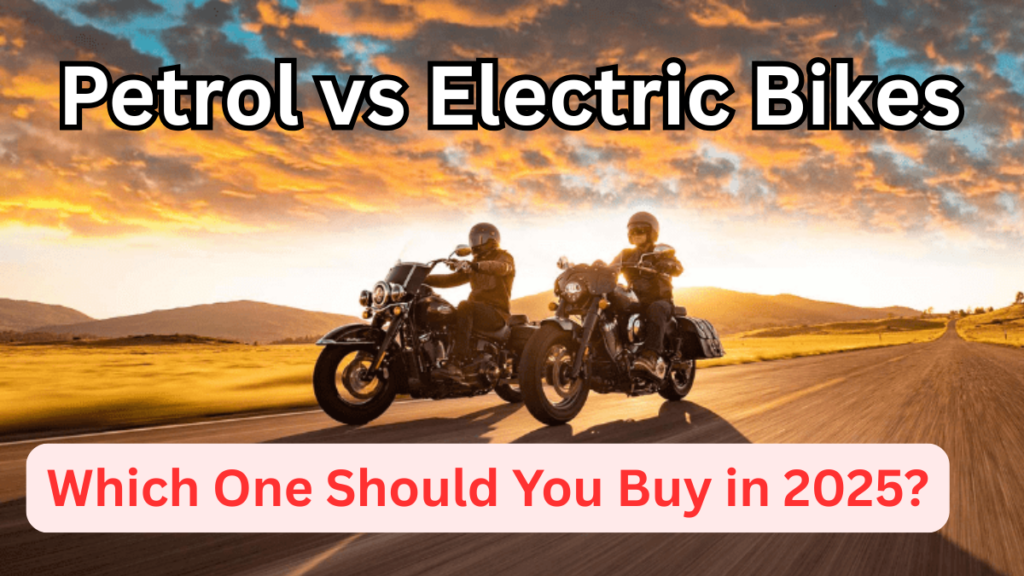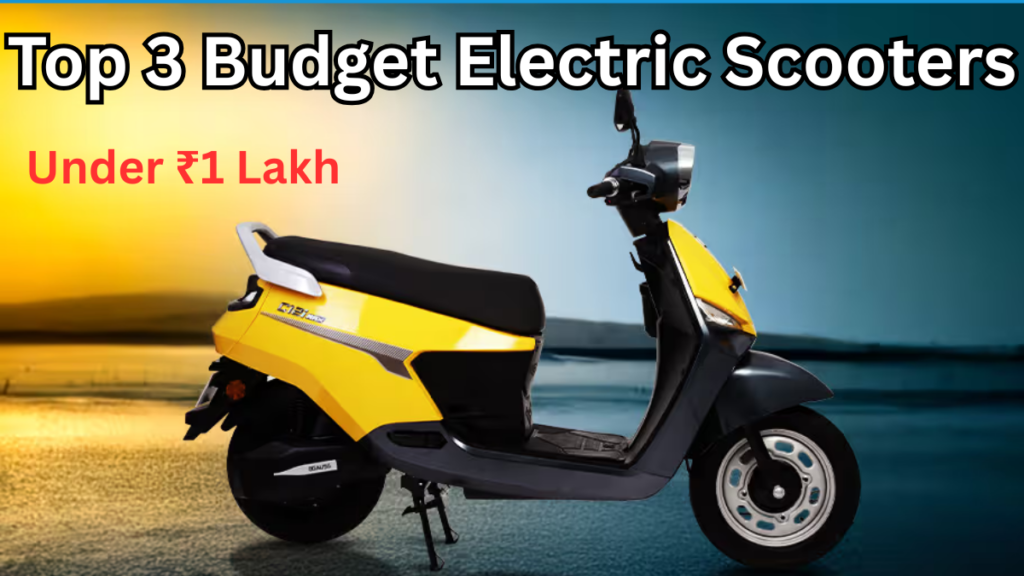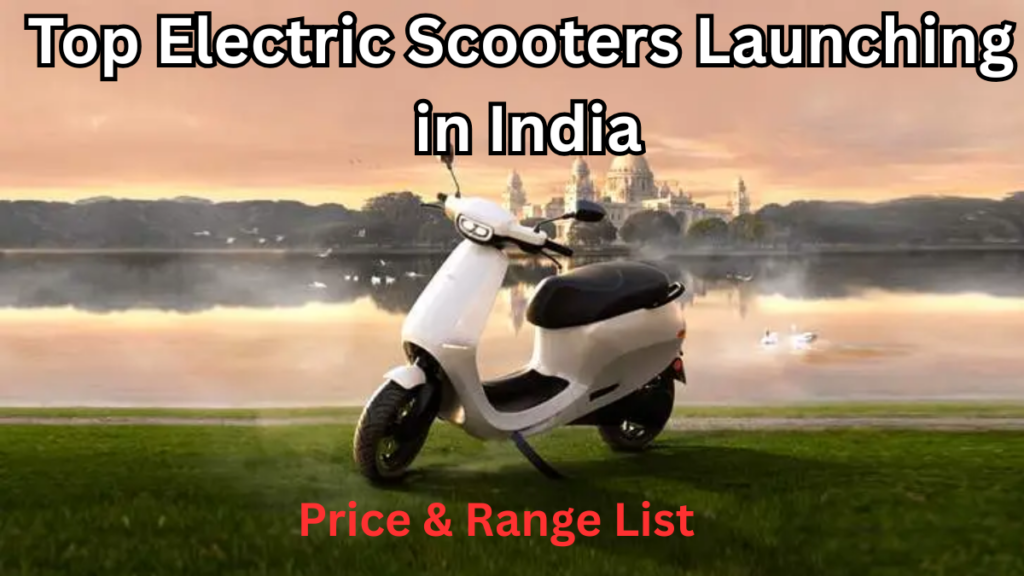Choosing the right bike in 2025 is no longer just about design or engine power—it’s about sustainability, cost-efficiency, and long-term value. With electric bikes (EVs) entering the mainstream and petrol bikes still holding strong, it’s time to dive into the real differences between petrol and electric bikes.
Here’s a comparison to help you decide which one fits your lifestyle best.

Table of Contents
Quick Comparison: Electric vs Petrol Bikes

Feature |
Petrol Bikes |
Electric Bikes (EVs) |
|---|---|---|
Fuel Type |
Petrol |
Electricity (Battery) |
Running Cost |
High (Petrol prices, maintenance) |
Low (Charging cost, fewer parts) |
Initial Cost |
Lower |
Higher (But falling fast) |
Maintenance |
Frequent servicing needed |
Minimal maintenance |
Top Speed |
Usually higher |
Improving but often lower |
Range |
400–600 km per tank |
80–150 km per charge |
Emissions |
Emits CO₂ and other pollutants |
Zero emissions |
Charging/Refueling |
Quick refueling |
Charging takes 1–6 hours |
Noise |
Loud engine sound |
Silent operation |
Resale Value |
Established market |
Emerging but improving |
Performance Comparison: EV vs Fuel Bikes
Understanding the performance comparison between petrol and electric bikes is crucial, especially if you care about speed, power delivery, and day-to-day reliability.
Acceleration and Torque
-
Electric bikes offer instant torque, which means quicker starts at traffic signals.
-
Petrol bikes build up torque over time, offering a more progressive power curve.
Top Speed
-
Petrol bikes generally deliver higher top speeds, especially in mid-to-high-end models.
-
Electric bikes are getting faster, but still trail behind performance-oriented petrol bikes.
Range and Refueling
-
Petrol bikes offer long ranges per tank and fast refueling anywhere.
-
Electric bikes offer shorter ranges and require charging stations or home setups.
Why Consider an Electric Bike in 2025?
Electric bikes are growing fast in popularity, and for good reason. Here’s why they could be the smarter choice for modern riders:
-
Lower running and maintenance costs
-
Environment-friendly with zero emissions
-
Government incentives like tax rebates and registration benefits
-
Modern tech features like mobile connectivity and GPS integration
-
Smooth, silent ride ideal for city commuting
Why Stick to a Petrol Bike?
Petrol bikes still make a strong case in certain situations. If you’re a long-distance rider or love classic motorbike power, consider the following:
-
Ideal for long highway rides with quick refueling
-
Higher top speed and more engine power options
-
Established service network and parts availability
-
More choices in sports, cruiser, and touring segments
Which One Should You Buy in 2025?
Here’s a comparison based on user profiles to help you decide between EV vs fuel bikes:
Rider Type |
Best Option |
Reason |
|---|---|---|
Daily City Commuter |
Electric Bike |
Low cost, no emissions, ideal for short distances |
Weekend Adventurer |
Petrol Bike |
Greater range and performance |
Budget-Conscious Buyer |
Electric Bike |
Long-term savings on fuel and servicing |
Speed Enthusiast |
Petrol Bike |
More top-end options available |
Tech Lover |
Electric Bike |
Smart features and modern design |
Key Differences Between Petrol and Electric Bikes
To wrap it up, here are the main differences between petrol and electric bikes that you should consider:
-
Fuel Type: Petrol vs Electricity
-
Cost of Ownership: EVs are cheaper to maintain and run
-
Performance: Petrol bikes currently lead in power and speed
-
Eco Impact: EVs produce zero emissions
-
Convenience: Petrol bikes offer fast refueling, EVs need charging time
FAQs:
Q1: Are electric bikes really cheaper in the long run?
Yes, while they may cost more upfront, electric bikes offer lower running costs, fewer repairs, and government subsidies—making them more economical over time.
Q2: Can electric bikes be used for long-distance travel?
Most electric bikes are designed for city commuting, with a range of 80–150 km. However, some premium models now offer extended ranges. For longer rides, petrol bikes still provide better convenience.
Q3: Which bike has better resale value—petrol or electric?
Currently, petrol bikes have a stronger resale market due to their established popularity. But as EV adoption grows, resale value for electric bikes is expected to improve.
Q4: Are electric bikes suitable for hilly terrain?
Yes, many electric bikes perform well on inclines thanks to instant torque. Just ensure the bike has a powerful motor and a high-capacity battery for such conditions.
Final Thoughts
The differences between petrol and electric bikes are becoming more nuanced with every new model released. Electric bikes are no longer just an eco-friendly alternative—they’re practical, efficient, and increasingly stylish. Meanwhile, petrol bikes still dominate in raw performance and highway convenience.
If you’re commuting in the city and want to save on fuel while contributing to a greener planet, go electric. But if you’re all about speed, power, and long rides, a petrol bike might still be your best bet in 2025.
Click here to learn more






